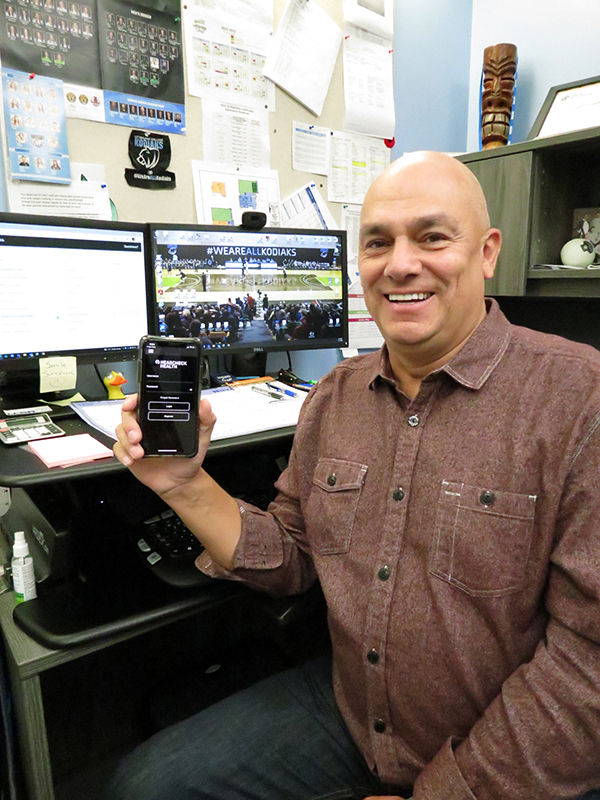Todd Caughlin, manager of Kodiaks Athletics, shows off the smart phone app for the newly aquired HeadCheck Health system software Nov. 18, 2021.
Lethbridge College athletics have received a new tool to help in the treatment of concussions.
Thanks to a donation from the Kodiaks Association, a group that raises money for Kodiaks Athletics, the HeadCheck Health system has been purchased for the use of all coaches and trainers.
Speaking about the Association’s involvement, Todd Caughlin the manager of Kodiaks Athletics, explained they are all former Kodiaks staff, so they understand the needs of the department.
“They understand the value of safe return to sport, after injury and they have taken such an amazingly interactive role on that,” said Caughlin.
The HeadCheck Health system is software that keeps a database of every athlete and tracks their treatment.
It provides a baseline test for every athlete before the season starts, then if one should incur a head injury the software will help medical staff to diagnose a concussion and keep track of their care as they recuperate.
Greg Gibos the head coach for men’s volleyball is happy for the purchase, since volleyball can be one of the more prominent sports for concussions.
“Volleyball is actually a shocking sport for how many concussions there are, a lot of it comes from play at the net,” said Gibos adding, “a lot of our athletes have their heads over the net so if their hands aren’t in the right spot, then ball can impact them pretty hard.”

Caughlin feels all sports are seeing an increase in concussions which is why it was important for all teams to be using the system and for the Kodiaks to have the system now.
“It’s a lot more common in every sport now which is you know, kind of wild but that’s another reason why we were able to get it,” said Caughlin.
The problem with concussions is that after a player is injured it can be difficult to determine when they have recovered fully. It isn’t something that can be seen on a diagnostic scan.
“Having this in place is really going to give us a clearer picture for where our athletes are at and what we can expect for them to return to play as quick as possible, in a safe manner,” said Gibos.
According to the Canadian Institute for Health Information on sport related brain injuries published in 2018, 94 per cent of all sport related brain injuries seen in Ontario and Alberta from 2016 – 2017 are concussions.
The advantage for the HeadCheck system is ease of use. To get the baseline test each player watches a 15-minute video then has a 15-minute appointment. The system can be accessed in a smartphone app so all coaches, trainers and medical staff can be on the same page with regards to an athlete’s recovery.
“This simplifies [treatment] and it makes the communication as clear as it can possibly be, again, with the ultimate goal that we get the student athlete back to return to competition in the safest manner possible,” said Caughlin.
Looking long term Gibos is confident the system will continue to be an asset for the future of the College’s athletics program.
“I think it’s something that’s really going to benefit not only the whole institution, but athletes in particular. It’s always nice to have a really confident diagnosis and a really, you know, sure plan for a safe return to play,” said Gibos.



